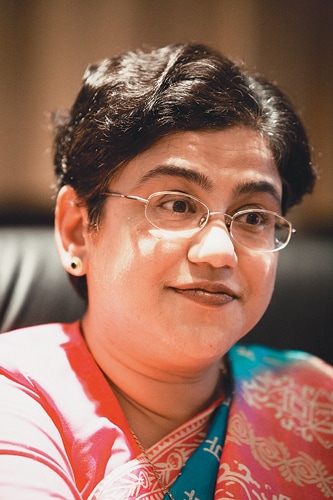
Will Crisil Make the Grade?
Credit ratings agency Crisil will soon be grading equity shares. Managing Director and CEO Roopa Kudva tells Forbes India why Crisil is getting into this business and whether it can pull it off
Name: Roopa Kudva
Title: MD and CEO, Crisil; Region head, South Asia, Standard & Poor’s
Age: 46
Qualification: Degree in Statistics and a postgraduate diploma in management from Indian Institute of Management, Ahmedabad.
Work experience: She joined Crisil in 1992. In 1998, she was seconded to Standard & Poor’s, Paris as director, financial institutions ratings.
Hobbies: Reading and travelling.
Why do you want to start grading the equity capital of listed companies?
All our businesses are based on two principles — analytical rigour and independence. That’s how we hit upon the equity space. Here we noticed two things. All the research that is being done in India is done by sell side firms, that is, brokers selling research to fund managers. No independent equity research is being done. Secondly, there is hardly any coverage for companies beyond the top 100. Beyond the top 500 companies there is no coverage at all. The other thing we noticed was that a significant equity research is buy recommendation.
Selection of equity is taking a valuation call. How can a credit rating agency figure this out?
When it comes to equity investment decisions, there are three important questions that need answers. If the company I’m investing is fundamentally strong or how strong is the earnings growth. Second, if the company has strong fundamentals, is it available at the right price? Thirdly, even if it is a fundamentally strong company is it a right investment for me? The buy-hold-sell model tries to answer these questions together. We want to concentrate only on the first question. With our analytical capabilities we should be able to do it. It should not be taken as a buy-hold-sell recommendation.
Cynics say that you just want to make more money?
We have to utilise the existing strengths that Crisil has to make markets function better. Crisil does not participate in the markets and this gives us a great opportunity to provide independent
equity research.
Does this happen globally?
It may not be exactly in the form of how we outline the product but the concept of independent research took off first in the US after the Spitzer settlement. In Singapore and Malaysia, we have the concept of exchange sponsored research.
But how will you grade 5,000 listed companies?
The new product totally depends on how we are able to successfully explain this whole concept to the market. This might take time. We have to invest into market education. This is a new research model and concept. In the first year, it is unlikely that we will cover 1,000 companies. The pick up will be gradual.
Are we talking of a market that is below the top 500 companies?
Not really. If a big company wants to get a grading done we will do it. In fact, there are some big companies who are liking this concept and would like to go for a grading. It is a different thing that we want to concentrate on smaller companies that are not covered by the market.
(This story appears in the 30 November, -0001 issue of Forbes India. To visit our Archives, click here.)





